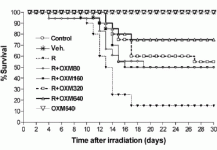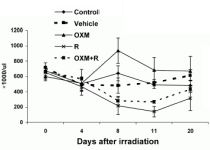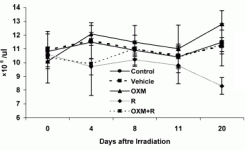Nuclear war? Oxymetholone offers protection
Iranian researchers have found a substance that may protect against nuclear radiation: the anabolic steroid oxymetholone [structure below]. The Iranians tested a radiation dose equivalent to what would be released in a nuclear war.
Radiation damages the tissues that produce blood cells. It leads to a reduction in the number of blood platelets. As a result wounds don't heal, and eventually internal bleeding occurs as well. The production of red blood cells also declines and then tissues no longer get enough oxygen. Lastly the production of white blood cells also goes down, leading to a decline in the body's immune system and making it game for all sorts of pathogens.
Nuclear researchers at the Mazandaran University of Medical Sciences and the Novin Medical Radiation Institute describe in Molecular and Cellular Biochemistry how a radiation dose of 8 Gy decimates a population of mice, and how a single dose of oxymetholone keeps the animals alive. The mice were given the steroid a day before they exposed to radiation. The more oxymetholone the animals were given, the more effective it was.
*
R = radiation; OXM = oxymetholone. Of the mice that were given a placebo 15 percent survived. Of the mice that were given the highest dose of oxymetholone [640 mg per kg] 75 percent survived.
When the researchers studied the animals they observed that oxymetholone prevented the concentration of blood platelets from decreasing as a result of the radiation.
The concentration of red blood cells did not decline either in the animals that were given oxymetholone.
Radiation also decreases the amount of white blood cells in the mice, but oxymetholone did nothing to help this.
The researchers conclude that oxymetholone would also protect humans against radiation. "Because of the effect of oxymetholone on stimulating and proliferation of bone marrow progenitors cell, it can be effective for protection and treatment of radiation-induced hematopoietic injury", they write. They also add that oxymetholone is not carcinogenic, although long-term use of high doses can lead to liver damage.
Similar projects are running in the US. Under the BioShield programme, researchers are examining the protective effect of Neumune, a steroid that until recently was on the market as a prohormone under the name of 5-androstenediol. According to the biotech company HollisEden Pharmaceuticals, radiation tests carried out at a Dutch research institute show that 5-androstenediol not only increases production of red blood cells and platelets, but also boosts production of white blood cells. The same company is now doing trials with an improved version of 5-androstenediol,*17-alpha-ethynyl-5-androstene-3-beta,7-beta,17-beta-triol*orTriolex.
Source:*
Mol Cell Biochem. 2006 Jul;287(1-2):193-9.



Iranian researchers have found a substance that may protect against nuclear radiation: the anabolic steroid oxymetholone [structure below]. The Iranians tested a radiation dose equivalent to what would be released in a nuclear war.
Radiation damages the tissues that produce blood cells. It leads to a reduction in the number of blood platelets. As a result wounds don't heal, and eventually internal bleeding occurs as well. The production of red blood cells also declines and then tissues no longer get enough oxygen. Lastly the production of white blood cells also goes down, leading to a decline in the body's immune system and making it game for all sorts of pathogens.
Nuclear researchers at the Mazandaran University of Medical Sciences and the Novin Medical Radiation Institute describe in Molecular and Cellular Biochemistry how a radiation dose of 8 Gy decimates a population of mice, and how a single dose of oxymetholone keeps the animals alive. The mice were given the steroid a day before they exposed to radiation. The more oxymetholone the animals were given, the more effective it was.
*
R = radiation; OXM = oxymetholone. Of the mice that were given a placebo 15 percent survived. Of the mice that were given the highest dose of oxymetholone [640 mg per kg] 75 percent survived.
When the researchers studied the animals they observed that oxymetholone prevented the concentration of blood platelets from decreasing as a result of the radiation.
The concentration of red blood cells did not decline either in the animals that were given oxymetholone.
Radiation also decreases the amount of white blood cells in the mice, but oxymetholone did nothing to help this.
The researchers conclude that oxymetholone would also protect humans against radiation. "Because of the effect of oxymetholone on stimulating and proliferation of bone marrow progenitors cell, it can be effective for protection and treatment of radiation-induced hematopoietic injury", they write. They also add that oxymetholone is not carcinogenic, although long-term use of high doses can lead to liver damage.
Similar projects are running in the US. Under the BioShield programme, researchers are examining the protective effect of Neumune, a steroid that until recently was on the market as a prohormone under the name of 5-androstenediol. According to the biotech company HollisEden Pharmaceuticals, radiation tests carried out at a Dutch research institute show that 5-androstenediol not only increases production of red blood cells and platelets, but also boosts production of white blood cells. The same company is now doing trials with an improved version of 5-androstenediol,*17-alpha-ethynyl-5-androstene-3-beta,7-beta,17-beta-triol*orTriolex.
Source:*
Mol Cell Biochem. 2006 Jul;287(1-2):193-9.




